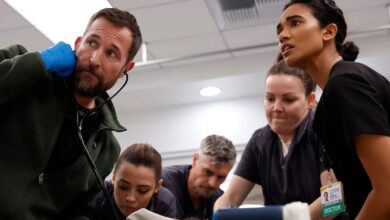Violent video games under scrutiny after shootings
Are violent video games a driving force behind school shootings and other acts of violence? President Trump believes so and he invited both game makers and their critics to the White House this week to talk about it.
The meeting included executives from the video game industry as well as organizations concerned about violence in our youth culture. In attendance were Robert Altman, the CEO of ZeniMax Media, publishers of the Fallout, Doom, and Wolfenstein game franchises; Michael Gallagher, head of the ESA, as well as Strauss Zelnick, CEO of Take-Two Interactive, which owns Rockstar Games, makers of the Red Dead Redemption and Grand Theft Auto game franchises.
In addition, the meeting included Patricia Vance, president of the Entertainment Software Rating Board — a ratings organization created after a series of congressional hearings on explicit content in video games was held in 1992 and 1993, followed by a threat by the federal government to regulate the industry if game makers didn’t do so first.
The evidence is overwhelming that games and violent media consumption in general cause children to become violent themselves. It’s a debate that has heated up in the wake of last month’s Florida school shooting and one that took center stage at the White House on Thursday.
During a 2017 seminar held at the National Rifle Association’s annual conference, Dave Grossman told the crowd, “Can anyone deny that we’ve raised the most vicious generation of killers the world has ever seen? They’ve given us crimes that children have never dreamed of. They’ll give us crimes as adults in our darkest nightmares we never imagined.” On the subject of mass shootings, he added, “The one factor the killers have in common: every one of them dropped out of life and immersed themselves in the sickest movies and the sickest video games. The guns have always been there. The sick movies and the sick video games are creating sick, sick kids.”
Grossman is published a book in 2016 titled Assassination Generation: Video Games, Aggression, and the Psychology of Killing, in which he argues that video games were creating a generation of violent murderers who could only be stopped with more guns.
President Trump has made video games a focus as he looks for solutions to gun violence after the massacre at Marjory Stoneman Douglas high school in Parkland, Florida. He has publicly bemoaned the abundance of violent media easily accessible to children, including his young 12-year-old son Barron.
Vicky Hartzler (R-MO), who represents Missouri’s 4th Congressional District, has also spoken out about her concerns regarding video games — particularly in light of calls for gun control legislation, which she described in a Politico op-ed written after the Sandy Hook shootings as a “common and simplistic response.” In that piece, she said: “We must have a meaningful conversation about mental health issues and other possible cultural and societal contributors to violent behavior, such as violence in video games.”
A White House statement “acknowledged some studies have indicated there is a correlation between video game violence and real violence,”
“The conversation centered on whether violent video games, including games that graphically simulate killing, desensitize our community to violence.”
The president’s and Hartzler’s viewpoints are sharply challenged by the multi-billion dollar video game industry, whose leaders came to the White House Thursday along with one of its most vocal critics, the Parents Television Council (PTC).
The industry doesn’t believe the decades of research that show a direct link between gun violence in real life. On the other hand, groups that advocate for greater parental controls say research shows a definite correlation between violent media consumption and long-term harm to a child.
“What I heard in today’s meeting is that the entertainment industry is still fighting to maintain the status quo and is not ready or willing to confront the impact that media violence has on our children. But time is up for the entertainment industry to put a stop to marketing graphic, explicit, and age-inappropriate content to our children,” PTC Program Director Melissa Henson told reporters after the closed door meeting.
“The video game representatives pulled out their same old talking points that have long been refuted. During the meeting, I was able to interject and say just how untrue their excuses are,” she added.
PTC President Tim Winter stated that violent video games “desensitizes kids to real-life violence, encourages them to resolve disputes with violence and gives them an unfair sense of fear of their environment around them–that it’s more dangerous than it is.”
Winter said that given the billions that advertisers spend every year to change behavior, he finds it ludicrous to believe that violent media consumption is not also influencing children’s behavior.
The Entertainment Software Association released a statement prior to the White House meeting saying that studies “have found no connection between games and real-life violence. The statement also touted “the tools we provide to make informed entertainment choices.”
The PTC also disputes the effectiveness of those tools, especially with regards to television. It points out its November 2017 survey of primetime broadcast TV shows which found that every program containing graphic violence or gun violence was rated TV-PG or TV-14.
“We are told to use the ratings. But those ratings are often misleading, or outright deceptive. The process by which the ratings are applied is secretive, those who administer them are accountable to nobody; and parents have no real recourse when they are misapplied,” Henson said.
While Thursday’s meeting didn’t end with a final solution, Winter said President Trump was attentive and listened to everyone’s perspectives.
“We were proud to be included at the table. We hope that this is just the first step towards meaningful reform, meaningful remedies and solutions to our real life gun violence,” he said.
Washington most recently focused on video game violence in the aftermath of the shooting at Sandy Hook elementary school in Newtown, Connecticut in 2013. Vice president Joe Biden held three days of talks on gun violence prevention and also met with video game industry executives.
After the meetings the White House called for research on the effect of media and video games on gun violence but no substantial progress was made.
In 2011 the Supreme Court turned over a California law that banned the sale of violent video games to children. The court ruled that the games are protected by the First Amendment.








